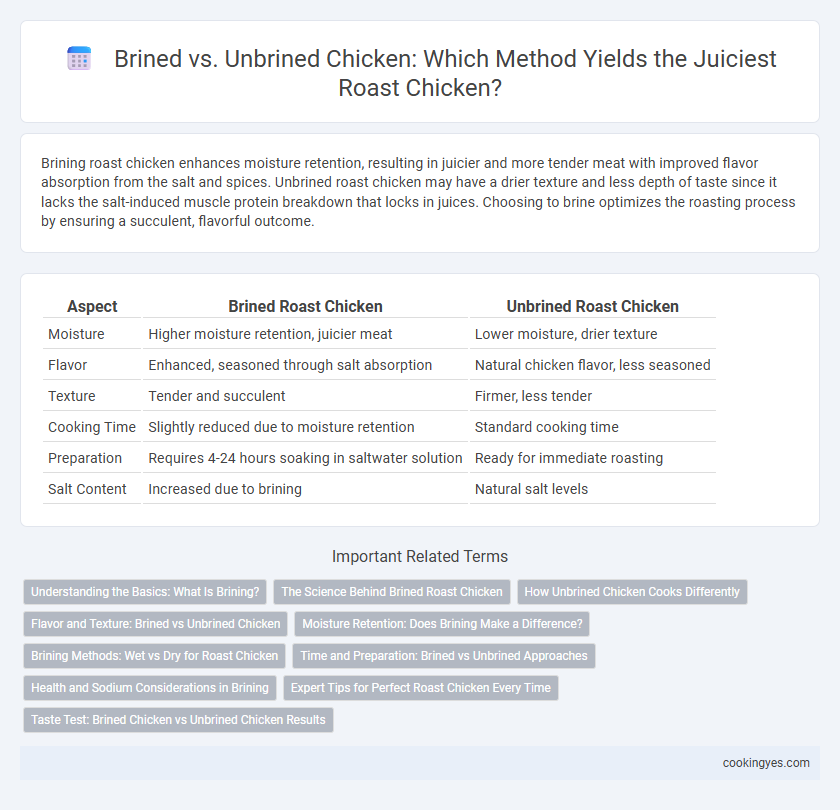Brining roast chicken enhances moisture retention, resulting in juicier and more tender meat with improved flavor absorption from the salt and spices. Unbrined roast chicken may have a drier texture and less depth of taste since it lacks the salt-induced muscle protein breakdown that locks in juices. Choosing to brine optimizes the roasting process by ensuring a succulent, flavorful outcome.
Table of Comparison
| Aspect | Brined Roast Chicken | Unbrined Roast Chicken |
|---|---|---|
| Moisture | Higher moisture retention, juicier meat | Lower moisture, drier texture |
| Flavor | Enhanced, seasoned through salt absorption | Natural chicken flavor, less seasoned |
| Texture | Tender and succulent | Firmer, less tender |
| Cooking Time | Slightly reduced due to moisture retention | Standard cooking time |
| Preparation | Requires 4-24 hours soaking in saltwater solution | Ready for immediate roasting |
| Salt Content | Increased due to brining | Natural salt levels |
Understanding the Basics: What Is Brining?
Brining is a culinary technique that involves soaking chicken in a solution of water, salt, and sometimes sugar and herbs to enhance moisture retention and flavor. This process increases the meat's ability to absorb and hold water, resulting in juicier and more tender roast chicken compared to unbrined methods. Understanding brining basics helps home cooks improve their roast chicken by preventing dryness and intensifying savory taste profiles.
The Science Behind Brined Roast Chicken
Brining roast chicken enhances moisture retention by allowing the meat to absorb and hold water through osmosis, which is crucial during cooking. The salt in the brine denatures proteins and increases the muscle fibers' ability to retain moisture, resulting in a juicier and more tender texture. This process also improves flavor distribution, ensuring the chicken is evenly seasoned throughout rather than just on the surface.
How Unbrined Chicken Cooks Differently
Unbrined chicken cooks faster but often results in drier meat due to less moisture retention during roasting. Without the salt absorption from brining, the muscle fibers contract more tightly, causing juices to escape and leaving the roast less tender. The skin may also brown unevenly, lacking the enhanced crispness achieved through the salt's effect on protein structure.
Flavor and Texture: Brined vs Unbrined Chicken
Brined roast chicken absorbs a saltwater solution that enhances moisture retention, resulting in juicier and more tender meat compared to unbrined chicken. The brining process also intensifies flavor by allowing salt and spices to penetrate the muscle fibers, creating a well-seasoned interior throughout the roast. Unbrined chicken often has a drier texture and a less pronounced taste, especially when roasted at high temperatures without additional seasoning.
Moisture Retention: Does Brining Make a Difference?
Brining roast chicken significantly enhances moisture retention by allowing the meat to absorb and retain extra water, resulting in a juicier texture after cooking. Unbrined chicken tends to lose more moisture during roasting, often leading to a drier end product. Studies show that brined chicken can retain up to 15% more moisture compared to unbrined counterparts, improving both flavor and tenderness.
Brining Methods: Wet vs Dry for Roast Chicken
Brining roast chicken enhances juiciness and flavor by allowing the meat to absorb salt and moisture, with wet brining involving submerging the chicken in a saltwater solution, while dry brining uses a salt and seasoning rub applied directly to the skin. Wet brining typically results in increased moisture retention and a tender texture, but requires more time and space, whereas dry brining promotes better skin crispiness and a concentrated flavor without excess water. Choosing between wet and dry brining depends on desired texture, timing, and preparation preferences for optimal roast chicken results.
Time and Preparation: Brined vs Unbrined Approaches
Brining a roast chicken typically requires 4 to 12 hours of soaking in a saltwater solution, which enhances moisture retention and flavor penetration, resulting in juicier meat after cooking. Unbrined chicken skips this step, reducing preparation time but potentially yielding drier and less flavorful results. The choice between brined and unbrined affects both the overall cooking timeline and the texture of the finished roast.
Health and Sodium Considerations in Brining
Brining roast chicken increases moisture and flavor by allowing the meat to absorb a saltwater solution, but this process significantly raises sodium content, which may pose health concerns for individuals managing hypertension or sodium intake. Unbrined roast chicken naturally retains lower sodium levels, offering a healthier option while potentially sacrificing some juiciness and tenderness. Selecting between brined and unbrined roast chicken depends on balancing flavor enhancement with dietary sodium restrictions and overall health priorities.
Expert Tips for Perfect Roast Chicken Every Time
Brining roast chicken enhances moisture retention by allowing salt to penetrate the meat, resulting in tender, juicy, and flavorful poultry. Experts recommend using a simple saltwater brine for at least 1 to 4 hours, depending on the bird's size, to achieve even seasoning and improved texture. For unbrined chicken, careful seasoning under the skin and precise roasting temperatures are critical to prevent dryness and maintain crisp skin.
Taste Test: Brined Chicken vs Unbrined Chicken Results
Brined roast chicken delivers enhanced juiciness and a more flavorful bite due to the salt solution's ability to retain moisture and season the meat internally. Unbrined chicken, while still tender when cooked properly, often lacks the depth of flavor and moist texture that brining imparts. Taste tests consistently show brined chicken as superior in succulence and savory richness compared to its unbrined counterpart.
Brined vs Unbrined for Roast Chicken Infographic

 cookingyes.com
cookingyes.com